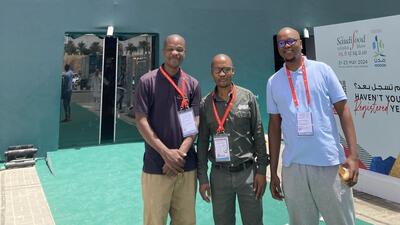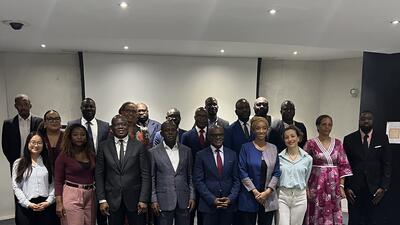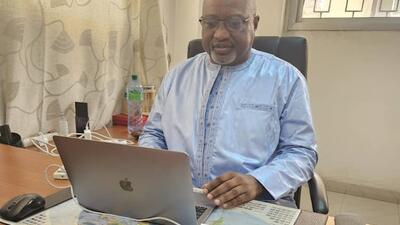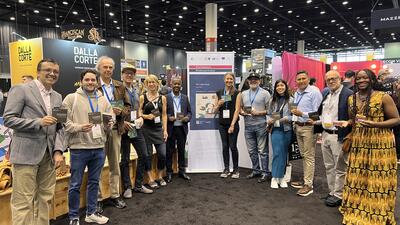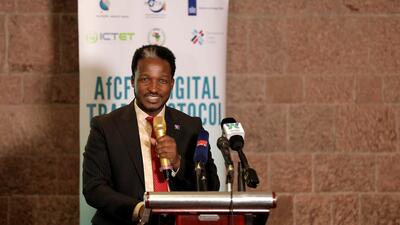
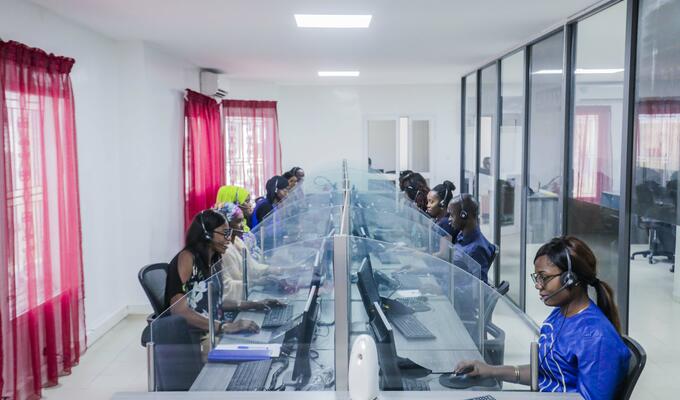

Call centre sees payoffs in training women for tech jobs
Nafi Sall runs a call centre business in Dakar. Her company Call Me has tapped into the growing demand for business process outsourcing, and created new job opportunities for Senegalese women.
Here she shares her thoughts on how to bring more women into innovative careers in technology.
Women play an important role in commerce in Senegal, because women hold most of the jobs in retail. They’re involved in importing products like tableware, food, fabrics, shoes, produce bags and fish, or even adding value to local products.
And in services, we all know that women tend to perform better in pitching and promoting services.
If we look at the current growth of ICT, specifically in ecommerce, women lead in online sales because their follow-through is better.
Also in digital marketing, which is very popular today, women are getting a stronger presence. That’s why interactive voice servers and bots use feminine voices, which are perceived as more sensitive and client friendly.
So we have to think about different strategies for companies and partners to increase the role of women in commerce, by using innovation and technology. And we can think of three points: raising awareness through close and interactive communication; training in ICT jobs and skills; and short to medium-term support.
Raising awareness
To promote gender inclusion, women must learn how to use technology to increase productivity and save time. For example, women who add value to local products can use technology to work with new sales platforms where their goods can find more customers in more countries in the region.
And other tools like digital inventories can help better manage stock and supply chains. That allows women to take a greater role by sharing well-defined strategies that optimize results. Learning how to build and invest in new markets, with an eye toward innovative markets, promotes equality of the sexes and women’s empowerment.
Training
When we talk about raising awareness, we’re talking about training. All the women working in different sectors, contributing so much to different parts of our economy, need training in how to use innovative strategies and new technologies. That’s why training in new technologies is needed, so that the desired results are achieved.
Look at the example of women farmers in northern Senegal. In a UN-WOMEN project, they were trained to use drones to improve their planning and to precisely estimate how much fertilizer they needed – without having to walk over vast areas of land.
And for new careers, women in business want training in how to use new artificial intelligence tools. Some companies even find that turnover is lower among women who receive such training.
Support from the International Trade Centre with the NTF V project is one concrete example of having helped get more women into Senegal’s digital ecosystem.
Technical and financial support
Technical support means helping women follow though to manage projects well, with strategic oversight.
Following a computerized action plan, with deadlines, allows for a shared dashboard where tasks are assigned, progress is tracked, and any delays are flagged.
Rapid technological development and innovation gives new opportunities and challenges for women in business.
Women need access to financing that’s underpinned by the knowledge that technology and innovation don’t automatically benefit everyone. Resources need to focus on women’s needs, with partners in a variety of fields adopting gender-specific tools and methods.
Ultimately, there remains a considerable gender gap in technological advancements and education in the digital age.
We hope these discussions will reiterate the rights of women to enjoy equal opportunities to learn the skills needed to work in innovative fields.
The Netherlands Trust Fund V (NTF) (July 2021 – June 2025) is based on a partnership between the Ministry of Foreign Affairs of The Netherlands and the International Trade Centre. The programme supports MSMEs in the digital technologies and agribusiness sectors. Its ambition is two-fold: to contribute to an inclusive and sustainable transformation of food systems, partially through digital solutions, and drive the internationalization of tech start-ups and export of IT&BPO companies in selected Sub-Saharan African countries.







